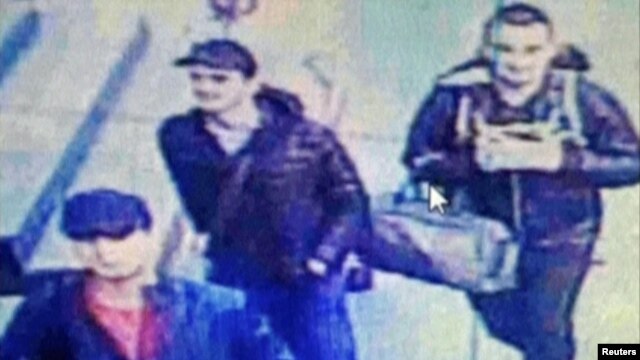Kyrgyzstan: Two Istanbul attackers had Russian passports
| Publisher | Radio Free Europe/Radio Liberty |
| Publication Date | 1 July 2016 |
| Cite as | Radio Free Europe/Radio Liberty, Kyrgyzstan: Two Istanbul attackers had Russian passports, 1 July 2016, available at: https://www.refworld.org/docid/57a43c3412.html [accessed 20 May 2023] |
| Disclaimer | This is not a UNHCR publication. UNHCR is not responsible for, nor does it necessarily endorse, its content. Any views expressed are solely those of the author or publisher and do not necessarily reflect those of UNHCR, the United Nations or its Member States. |
July 01, 2016
By RFE/RL
 An image from a CCTV camera shows the three men believed to be the attackers walking inside the terminal building at Istanbul's Ataturk airport on June 28.
An image from a CCTV camera shows the three men believed to be the attackers walking inside the terminal building at Istanbul's Ataturk airport on June 28.
Kyrgyz authorities say two of the men involved in the deadly Istanbul airport attack had Russian passports, amid speculation that a Kyrgyz national was involved.
The Kyrgyz Foreign Ministry said in a statement on July 1 that Turkish officials had identified the two as Rakim Bulgarov and Vadim Osmanov.
The identity or nationality of the third attacker had not been publicly released as of July 1.
Turkish media earlier had quoted an unnamed government official as saying the three attackers were from Kyrgyzstan, Uzbekistan, and Russia.
Uzbekistan's security service did not immediately comment on the reports, while Andrei Karlov, Russia's ambassador to Turkey, said that he had no information regarding the involvement of any Russian citizen.
Turkey, meanwhile, announced the detention of 13 more people, including three foreign nationals, in connection with the June 28 gun and suicide-bombing attack that killed at least 43 people and wounded more than 200 at Europe's third-busiest airport.
It was the deadliest in a series of suicide bombings in Turkey this year, and the latest of more than a dozen major attacks in that country in the past 12 months.
No group has claimed responsibility for the attack, but Ankara has blamed the Islamic State (IS) militant group.
Hundreds of Kyrgyz, Uzbek, and Russian nationals have joined IS fighters in Syria and Iraq, and some experts report that Russian is the second-most common language spoken among fighters there after Arabic.
Link to original story on RFE/RL website
